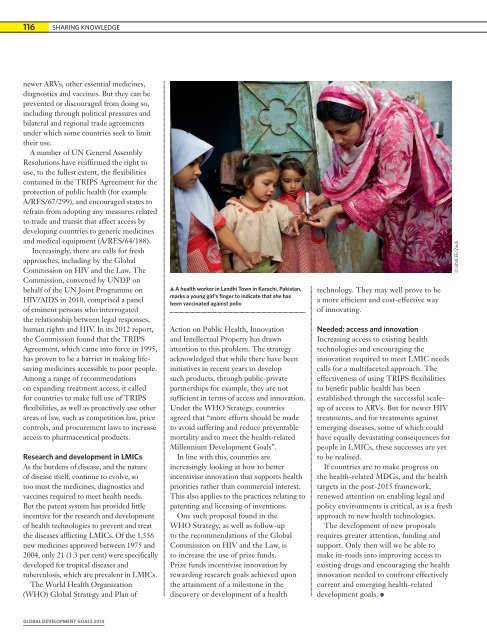FAMBB
FAMBB
FAMBB
Create successful ePaper yourself
Turn your PDF publications into a flip-book with our unique Google optimized e-Paper software.
116 SHARING KNOWLEDGEnewer ARVs, other essential medicines,diagnostics and vaccines. But they can beprevented or discouraged from doing so,including through political pressures andbilateral and regional trade agreementsunder which some countries seek to limittheir use.A number of UN General AssemblyResolutions have reaffirmed the right touse, to the fullest extent, the flexibilitiescontained in the TRIPS Agreement for theprotection of public health (for exampleA/RES/67/299), and encouraged states torefrain from adopting any measures relatedto trade and transit that affect access bydeveloping countries to generic medicinesand medical equipment (A/RES/64/188).Increasingly, there are calls for freshapproaches, including by the GlobalCommission on HIV and the Law. TheCommission, convened by UNDP onbehalf of the UN Joint Programme onHIV/AIDS in 2010, comprised a panelof eminent persons who interrogatedthe relationship between legal responses,human rights and HIV. In its 2012 report,the Commission found that the TRIPSAgreement, which came into force in 1995,has proven to be a barrier in making lifesavingmedicines accessible to poor people.Among a range of recommendationson expanding treatment access, it calledfor countries to make full use of TRIPSflexibilities, as well as proactively use otherareas of law, such as competition law, pricecontrols, and procurement laws to increaseaccess to pharmaceutical products.Research and development in LMICsAs the burdens of disease, and the natureof disease itself, continue to evolve, sotoo must the medicines, diagnostics andvaccines required to meet health needs.But the patent system has provided littleincentive for the research and developmentof health technologies to prevent and treatthe diseases afflicting LMICs. Of the 1,556new medicines approved between 1975 and2004, only 21 (1.3 per cent) were specificallydeveloped for tropical diseases andtuberculosis, which are prevalent in LMICs.The World Health Organization(WHO) Global Strategy and Plan ofA health worker in Landhi Town in Karachi, Pakistan,marks a young girl’s finger to indicate that she hasbeen vaccinated against polioAction on Public Health, Innovationand Intellectual Property has drawnattention to this problem. The strategyacknowledged that while there have beeninitiatives in recent years to developsuch products, through public-privatepartnerships for example, they are notsufficient in terms of access and innovation.Under the WHO Strategy, countriesagreed that “more efforts should be madeto avoid suffering and reduce preventablemortality and to meet the health-relatedMillennium Development Goals”.In line with this, countries areincreasingly looking at how to betterincentivise innovation that supports healthpriorities rather than commercial interest.This also applies to the practices relating topatenting and licensing of inventions.One such proposal found in theWHO Strategy, as well as follow-upto the recommendations of the GlobalCommission on HIV and the Law, isto increase the use of prize funds.Prize funds incentivise innovation byrewarding research goals achieved uponthe attainment of a milestone in thediscovery or development of a healthtechnology. They may well prove to bea more efficient and cost-effective wayof innovating.Needed: access and innovationIncreasing access to existing healthtechnologies and encouraging theinnovation required to meet LMIC needscalls for a multifaceted approach. Theeffectiveness of using TRIPS flexibilitiesto benefit public health has beenestablished through the successful scaleupof access to ARVs. But for newer HIVtreatments, and for treatments againstemerging diseases, some of which couldhave equally devastating consequences forpeople in LMICs, these successes are yetto be realised.If countries are to make progress onthe health-related MDGs, and the healthtargets in the post-2015 framework,renewed attention on enabling legal andpolicy environments is critical, as is a freshapproach to new health technologies.The development of new proposalsrequires greater attention, funding andsupport. Only then will we be able tomake in-roads into improving access toexisting drugs and encouraging the healthinnovation needed to confront effectivelycurrent and emerging health-relateddevelopment goals.© UNICEF/ZaidiGLOBAL DEVELOPMENT GOALS 2014


